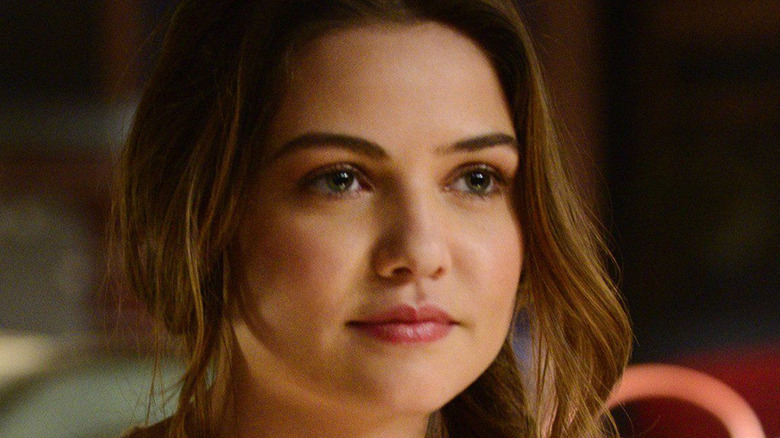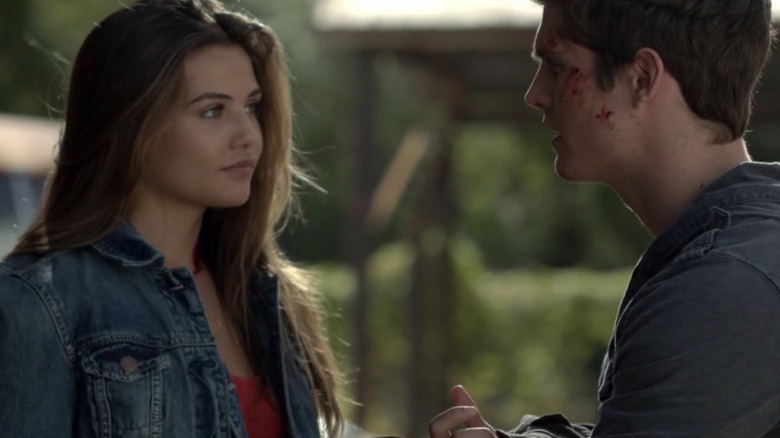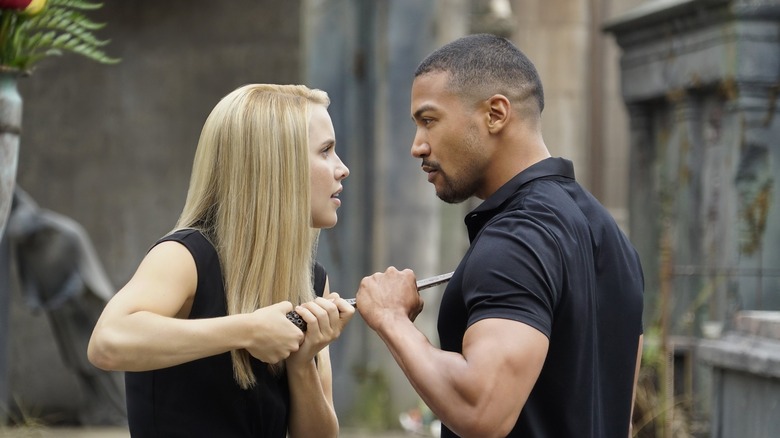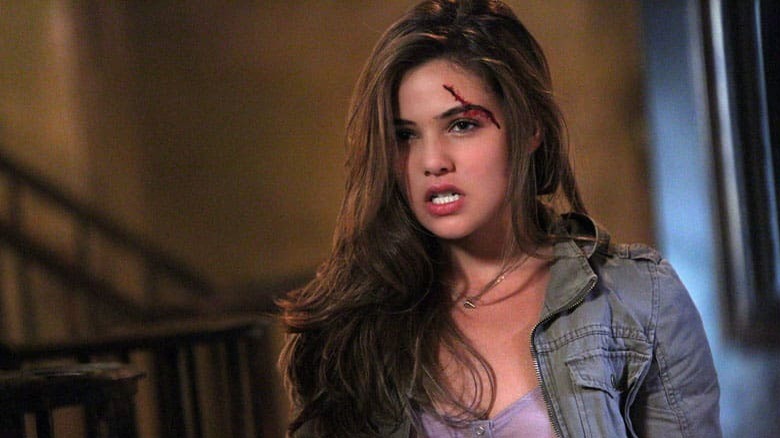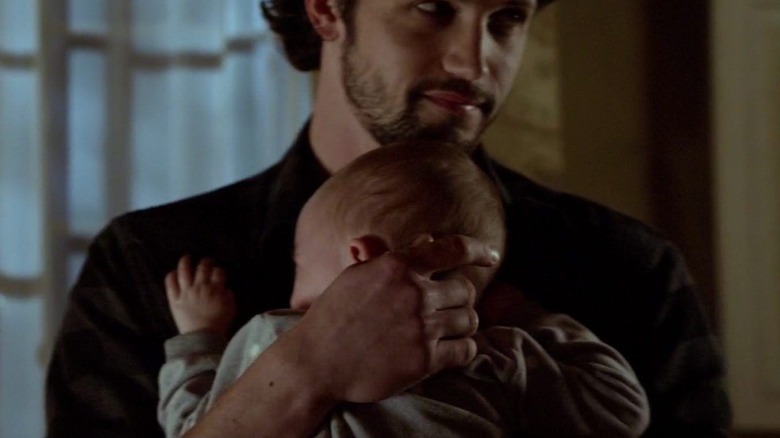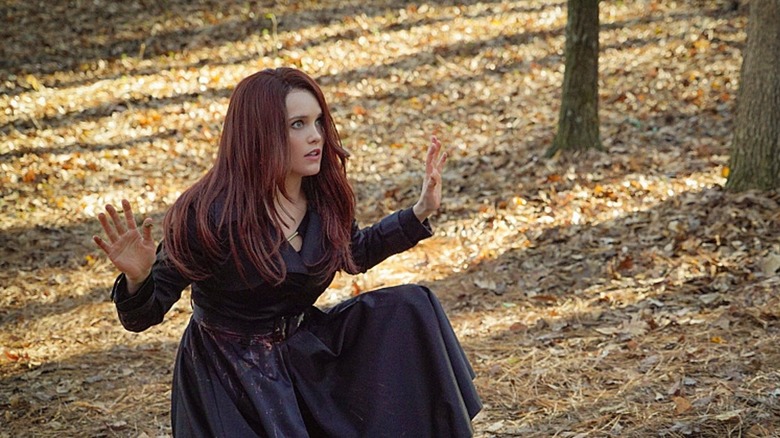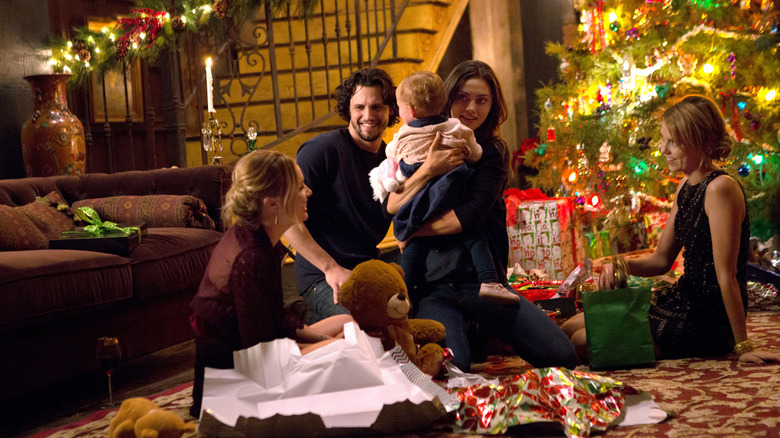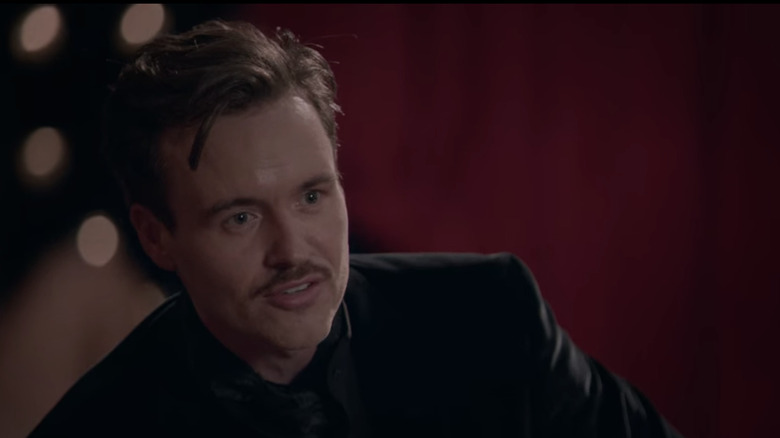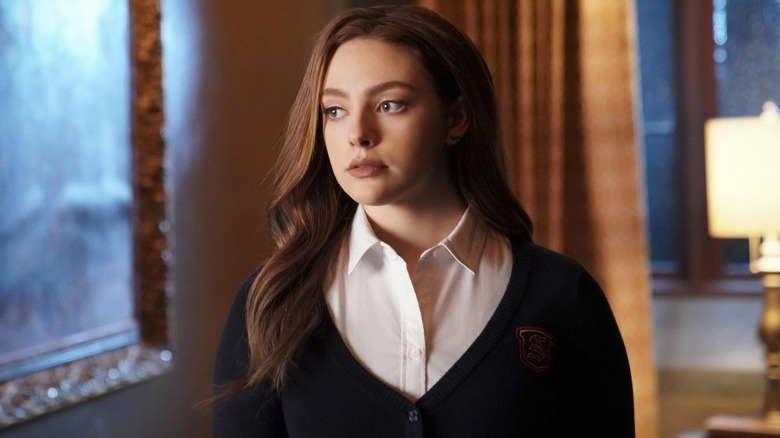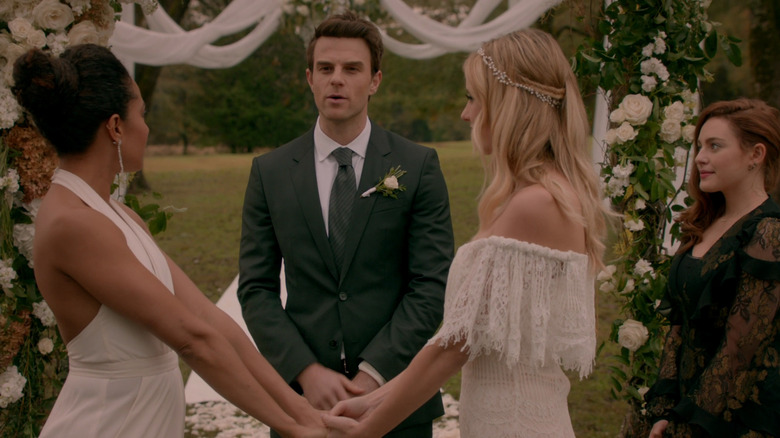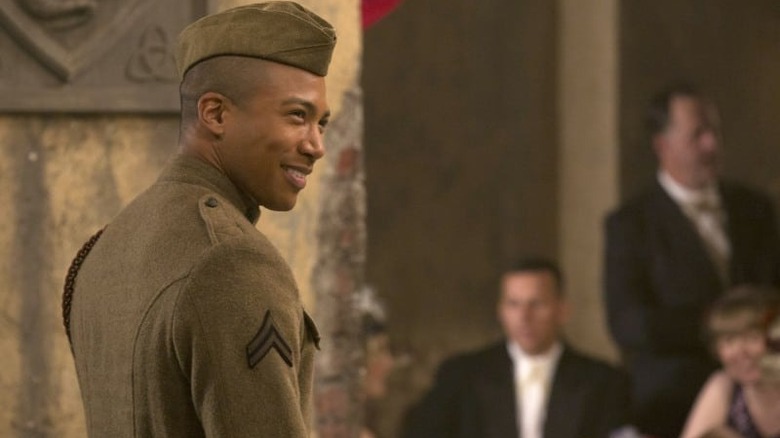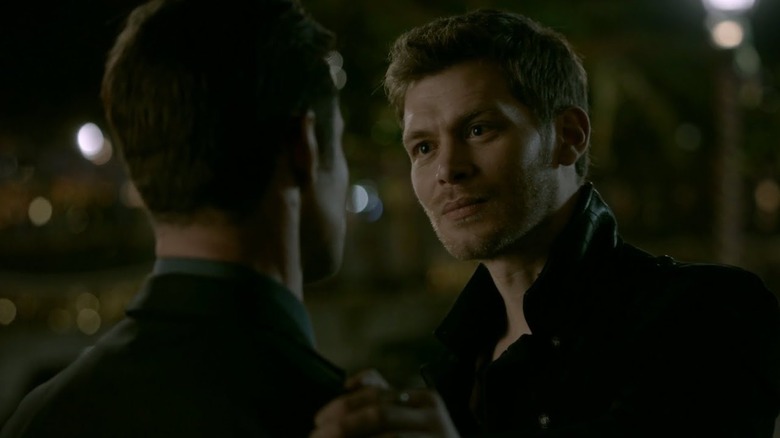Things Only Adults Notice In The Originals
"The Originals" is like an adult cousin to "The Vampire Diaries," despite the fact that it's actually a spinoff of that series. But while "Originals" does indeed have a more mature feel to it than the original series, "Vampire Diaries" fans flocked to the new show. Fans knew to expect a darker, grittier affair, given that it deals with the Mikaelsons, the original vampire family. They're pretty well-known for tending to have a "kill first, ask questions later" policy regarding threats against their own.
The stakes are ratcheted up even higher when Klaus Mikaelson, the most ruthless vampire in history, learns he has a daughter. This perspective — that of a parent — adds another adult layer to the series. "The Originals" kicks off as the Mikaelsons head back to New Orleans to tango with Klaus' adopted son, Marcel, who leads a faction of ruthless vampires who secured the French Quarter years prior. Between parenting woes, historical deep-dives, and dicey mental health depictions, there are quite a lot of details, references, and nods in "The Originals" that only adults notice. Did you catch them all?
Davina and Kol's relationship is wildly inappropriate
It's bad enough when a 100-year-old vampire dates a 17-year-old, but Kol and Davina take things even further. At more than 1,000 years old, Kol has no business eyeing a vulnerable teenager. Granted, Davina can certainly hold her own, but at the end of the day, she's yet another emotionally vulnerable young woman the whole world has taken advantage of — and Kol is part of the problem.
While wearing the meat suit of a baby-faced teenaged witch, Kol meets Davina while intending to use her for his mother's nefarious plan. Of course, his untoward intentions only add to the already shady power dynamic. There's no doubt that Kol cares about her almost immediately, and he definitely comes to love her — but that's precisely what should stop him from pursuing her. On some level, Kol is aware that he's not good for Davina. Yet he selfishly goes for it anyway, putting his desires ahead of her well being.
As time goes by and he gets his immortal body back, he does consistently put her first, even over his own family. They are also undeniably good for each other when she's in her late 20s. But Kol really should have been patient and waited for her to get to that point. The couple's early age difference and accompanying power dynamic are enough to make a fan wonder how much of her devotion stems from teenage infatuation.
Rebekah and Marcel's relationship straddles familial boundaries
Klaus and Marcel's relationship status changes about three times per episode, but that doesn't diminish the fact that Klaus essentially raised Marcel after killing his father and slave master. In the modern timeline of "The Originals," Klaus toggles between being a best friend, brother, enemy, and father to Marcel, depending on their respective moods. That being said, it's pretty awkward that Klaus' sister Rebekah has a long, sordid, on-and-off relationship with her sort-of nephew.
Sure, almost 100 years have gone by since Klaus adopted Marcel as a surrogate son. But Rebekah watched Marcel grow up during that period, making her essentially his aunt. Later in the series, flashbacks imply that they saw each other behind Klaus' back, even before Marcel became a vampire. As he was barely older than a teenager then, their relationship is rendered even creepier.
The age gap is uncomfortable enough, but the added familial element is a lot to unpack. They may not be related by blood, but their relationship's origin is decidedly of that nature. Again: She is basically his much-older aunt. Hello, child services? Rebekah's intentions are clearly never nefarious, but the weird familial power dynamic is there nonetheless.
Davina never goes to school
School is kind of important, even for an all-powerful witch. Understandably, Davina bails on school when every witch in New Orleans is hunting her down so they can sacrifice her for a shady Harvest Ritual. Most reasonable people would probably also lock themselves in a church attic instead of learning geometry. However, the target on Davina's back lifts after the Harvest Ritual happens anyway.
Now, school might not seem like the biggest priority once you've risen from the dead, but it is still important. Even after Davina has the all-clear to live her life again, school is only ever addressed once in passing — and we never see her actually go. There's never any kind of throwaway excuse offered as to how she avoids a truancy situation, although her death might be the answer to that lingering question. It certainly helps to have a vampire in your back pocket who can compel any unsuspecting human to look the other way. But that makes the situation even worse: As her surrogate father, Marcel should be looking out for Davina's best interests instead of using her as a pawn when he needs a powerful witch. She needs an education!
Jackson is a terrible stepfather
On the surface, Jackson seems like the perfect husband to Hayley and a doting stepfather to her daughter Hope. But if you look closer, he's not as perfect as he appears. Hayley makes it abundantly clear that she's still in love with Elijah when she marries Jackson for a werewolf pack unification, even though she also loves Jackson, albeit with less do-or-die passion. And, of course, like any good mother, she makes it clear that her daughter will come first. Jackson accepts these things in the moment, yet continually holds them against Hailey when their marriage isn't as rosy as he'd hoped.
Whenever Hayley embroils herself in Mikaelson drama, Jackson gets angry. She's not spending enough time with him, he believes, or she's unnecessarily putting herself at risk. But when Klaus Mikaelson is your child's father, his enemies become your kid's enemies. Said kid's family never stops being a part of your life in a situation like that: If they're in danger, so is your child. Hayley, as Hope's mother, simply cannot deny this.
At times, Jackson pats himself on the back for loving Hope as if he's doing Hayley some big favor. That's not anything someone deserves an award for. If Jackson truly cares for Hope the way he says he does, he shouldn't hold Hayley's motherly obligations against her — and he definitely shouldn't treat caring for his stepdaughter as some admirable act he can use to win an argument.
Aurora's portrayal is harmful
In Season 3, we meet Aurora, a vampire who has struggled with bipolar disorder. In fact, she's actually introduced in the midst of a manic swing. Her brother's solution to this involves keeping her captive through a group of monks she later slaughters.
Aurora's struggles with mental health are pretty horrifically portrayed. When she isn't erratically killing people for sport, Aurora enjoys toying with anyone who crosses her. Now, it's reasonable to assume that the heightened emotions of a bloodthirsty vampire would manifest a mental health condition more violently than is normal. Yet despite having Cami, a psychology grad student, as a main character on the show, "The Originals" never provides that kind of insight. In fact, Cami's spur-of-the-moment therapy session with Aurora does more to stigmatize the vampire than anything else, as Aurora is holding Cami captive. Aurora's arc had the potential to be groundbreaking, but instead, she falls into the same toxic tropes that most Hollywood depictions of mental illness fall under. The violent nature of Aurora's outbursts paint a negative picture of what people living with bipolar disorder are actually like.
If you or someone you know is struggling with mental health, please contact the Crisis Text Line by texting HOME to 741741, call the National Alliance on Mental Illness helpline at 1-800-950-NAMI (6264), or visit the National Institute of Mental Health website.
It makes no sense that Freya celebrates Christmas
Dear studio executives, not everyone celebrates Christmas — especially not a 1,000-year-old Viking witch!
It's a bit of a stretch that any of the Mikaelsons would celebrate Christmas, given their ancient origins. But it's reasonable to assume that Mikael raised the younger Mikaelson children to be Christian, as Christianity began spreading in Norway in the mid-800s. This might have been a survival tactic, given shifting cultural mores of the era. Still, it's not beyond reason that what started as a political move could become a deeply-held belief system. Given the fact that Esther (the Mikaelson matriarch) was a practicing witch, it's a bit surprising that her children wouldn't adopt traditional Viking paganism. Though admittedly, Mikael was an abusive father, and flashbacks heavily imply that his people kidnapped Esther and her sister because they were witches. On that level, it makes sense that he would be Christian and pass that along to his children.
Given that Freya was abducted and raised by her witch aunt when she was a child, however, it's a stretch that she would celebrate Christmas. Her Aunt Dahlia loathes the Vikings and is all about traditional witchcraft, so Freya definitely wouldn't have celebrated Christmas with her. She remains her aunt's captive until her siblings kill Dahlia in the present time. So seriously, what is up with the Christmas festivities?
August is a Nazi metaphor
"The Vampire Diaries" franchise has always been shy about dealing with horrendous history. Consider how it handles the history of slavery and Damon's history as a Confederate soldier — not great, right? The franchise will generally opt to skirt along the edges of rough eras without fully addressing them.
This sideline approach comes up again in "The Originals" when a Nazi vampire named August is introduced through flashback sequences in "Don't It Just Break Your Heart." Back in Germany in 1933, August ran a faction of vampires who spewed gross rhetoric about "purifying" the land. Hell-bent on annihilating the entire werewolf species, the depraved group wiped out legions of werewolves before Klaus, whose father was a werewolf, killed the lot of them. He did, however, accept the white flag from August's wife Greta, allowing her and her children to cause problems in the future.
While the series heavily hints at the parallels between Nazis and this werewolf-hating faction of vampires, the metaphor only becomes clearly addressed with a coin that bears a swastika. August's wife leaves it for Klaus in the present time, to let him know who he's dealing with: Pathetic Nazi vampires. The connection is already abundantly clear to anyone well-versed in history. Still, the series could have done a lot more to condemn the real Nazi figures involved, rather than halfway-address the salient issues through vague parallels.
Hope dreams of autonomy, but gets none
It's hard enough being a 15-year-old who's a partial witch, vampire, and werewolf, with the added perk of having the world's most notorious hybrid vampire as a father. Add in the fact that Hope Mikaelson faces life and death daily, and you've got yourself a real party. Between this doom, gloom, and teenage angst, Hope also continuously has her choices and autonomy stripped away. Everyone is more than happy to use her for their own ends, but the minute she tries to choose for herself, dear old dad shoots her down — when he bothers to show up, that is.
Autonomy is the one thing Hope's mother Hayley has always wanted Hope to have. With everything in her life consistently out of Hope's control, her choices should be her own. But they aren't. When Hope tries to bind her werewolf side to save her mom from Nazi vampire wife Greta, Klaus forces her to stop. Granted, it wouldn't have stopped Greta anyway, but it still adds to the responsibility Hope feels when her mother dies before her eyes. To make things worse, before she gets a front-row seat to her mother bursting into flames, she shares her first kiss is with an almost 100-year-old vampire moonlighting as a teenager. Who might this psuedo-teen be? Oh, just August's manipulative son, who's doing mommy's bidding.
Keelin displays Stockholm syndrome
When Hayley takes on the mission to rescue the Mikaelsons from a five-year-long impromptu slumber, she needs venom from every werewolf family to complete the antidote to Elijah's supercharged werewolf bite. So, naturally, Freya meets her future wife Keelin when the ages-old Mikaelson witch holds the werewolf captive to siphon out her venom.
When Hayley sets the werewolf free, Freya throws a temper tantrum. Even after they get what they need, Freya wants to hold Keelin captive indefinitely. Of course, she tracks Keelin down to finish what she started — but instead of holding Freya accountable, Keelin immediately sympathizes with her captor. With absolutely no build-up, and sparks coming out of nowhere, they begin a relationship ... with little discussion about Freya literally kidnapping, torturing, and holding her now-girlfriend hostage. Who wouldn't want to date someone who tortured and held them captive? Sounds like a great time!
From then on, Freya continuously chooses her family over Keelin, who barely seems to have a problem with it. While younger audiences might not be aware of Stockholm syndrome, which develops when someone who's been abducted sympathizes with their captor, the relationship feels forced and icky to anyone watching. They may be cute together, but their origin story needs some work and they need therapy.
Marcel fought in World War I
Welcome, again, to Cinematic History 101. Today's topic of discussion is "The Originals" and its murky historical flashback sequences. In Season 2, the series throws in a flashback, cluing fans in on how Marcel and Klaus began their decades-long feud. It's no surprise to anyone that Klaus would feel personally spurned by his surrogate son enlisting in the army: That's what happens when you have an abandonment complex as severe as Klaus'. But since Marcel isn't an original vampire, Klaus can't just indefinitely dagger him into desiccation when he's annoyed. And while he certainly makes a lot of threats, Klaus has shown time and time again that he can't actually bring himself to kill Marcel.
The show never outright says what war Marcel enlists in, beyond an offhand comment about Germans — which would make most viewers assume it's World War II. However, the United States fought against Germany in both World Wars, and it's clear, based on the Mikaelsons' clothing when the flashbacks cut to New Orleans, that the time period is the early 1910s, rather than the 1940s.
Additionally, while both uniforms look mildly similar, the details of Marcel's uniform clue fans in that he's fighting in WWI. To some fans, this choice dilutes what could have otherwise been a powerful historical statement: Having Marcel, who was once enslaved, fight against bigotry in WWII would have been a uniquely appropriate choice.
Elijah's death glorifies something awful
Elijah's entire vampiric existence is spent in the pursuit of Klaus' redemption. He gives up every ounce of happiness he's ever known to keep Klaus in line. And the relationships he doesn't give up willingly? Klaus takes those from him, of course. When he isn't killing their paramours, Klaus daggers his siblings into a desiccated state to punish them.
When Klaus finally learns to be a better person (er, vampire) after having Hope, he sacrifices himself to save his daughter's life. You'd expect Elijah to finally seek out happiness, right? Well, Elijah inadvertently allows Hayley to die when he's under a bout of compulsion amnesia. Getting back his memories of her destroys Elijah. Instead of trying to help him work through that, his siblings support his decision to kill himself.
Sure, Elijah has lived a long life. But very little of it is spent actually living. The show depicts his death as desirable, rather than what it really is: An impulsive decision made by someone who is very lost and depressed. That's not exactly a great message to send to a largely teen audience, no matter the context.
If you or anyone you know is having suicidal thoughts, please call the National Suicide Prevention Lifeline at 1-800-273-TALK (8255).
